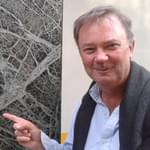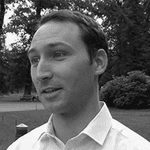Event Recording:
The cycle of carbon between the Earth’s surface and its deep interior is a key component of our goldilocks planet.
Without it we would not have life or water on the planet today. Natural carbon burial has provided us with the fossil fuels we have used to develop our technologically advanced society, but through greenhouse gas emissions, it is also rapidly starting to degrade the quality of life on the planet. To bring this cycle back into balance we need not only to cut emissions but also accelerate the natural return of CO2 back to the Earth. There is a plethora of methods for doing this.
In the 7th discussion in the Oxford Net Zero Series, hosted by the Oxford Martin School, Professor Mike Kendall, Professor Joe Cartwright and Dr Tom Kettlety will discuss sub-sea storage of CO2.

Professor Joe Cartwright
Professor of Earth Sciences
Joe's research interests are in understanding process linkages between depositional, diagenetic and deformational processes in sedimentary basins. He has primarily used seismic data for this purpose, and has built laboratories at Imperial College, London and Cardiff prior to coming to Oxford.
He is particularly interested in developing quantitative methods in 3D seismic interpretation to gain a better understanding of basin shaping and filling processes. Current projects include: the development of natural fractures in mudrocks, hydrocarbon migration and leakage, geological sequestration of carbon dioxide, the propagation of tectonic faults, the genesis of polygonal fault systems, the mechanics of sandstone and igneous intrusions, the genesis of giant submarine landslides, mechanisms and controls on highly focused fluid venting, the seismic characterisation of mudrocks as seals, and the seismic analysis of diagenetic reactions.

Professor Mike Kendall
Professor of Geophysics
Mike’s research interests cover pure and applied seismology, with connections to mineral physics, geodynamics and engineering. Current research concentrates on the nature of the core-mantle boundary, continental cratons, continental rifting, mid-ocean ridges, and subduction zones.
He has led seismic field experiments in a range of geologic settings. Techniques developed to study wave propagation in the deep Earth have also been applied to his research in exploration seismology. His interests lie in microseismicity and passive seismic monitoring, rock-fracture characterization, and linked geophysics, geomechanics and fluid-flow modelling. He has managed a number of large industry-funded consortia.

Dr Tom Kettlety
Postdoctoral Research Assistant, Department of Earth Sciences
Tom's research aims to better understand the physical mechanisms behind injection-induced seismicity and fault reactivation. He uses techniques employed in observational seismology, geomechanical modelling, reservoir geomechanics, and statistics to analyse large microseismic datasets from around the world.
His previous work has focused on using elastostatic models to study the continued propagation of seismicity, in order to inform monitoring practises and regulation (e.g. “traffic-light” schemes). This has been combined with fault stability analysis, to determine the likelihood of failure for faults near injection. His recent work has been investigating the application of statistical methods to forecast maximum magnitudes in real-time, using the observed microseismic populations to determine the likelihood of larger, more hazardous events.
He completed a MSci in Physics at the University of Bristol in 2016, and a PhD in Geology, also at Bristol, in 2020.

Dr Steve Smith
Executive Director, Oxford Net Zero
Dr Steve Smith joins the Smith School of Enterprise and the Environment from the UK Department for Business, Energy and Industrial Strategy (BEIS) where he co-led the Climate Science Team for two years. He played a key role in the legislation of the Net Zero emissions target last year, and on developing the Government's approach to greenhouse gas removal. As well as advising ministers and policy teams he oversaw several areas of climate research, including the Met Office Hadley Centre Climate Programme, the Greenhouse Gas Removal Programme co-funded with UKRI, and understanding of carbon sources and sinks on land for the UK emissions inventory.
Before joining BEIS, Steve was Head of Science at the Committee on Climate Change. There he was involved in setting the UK's 2050 target and carbon budgets, as well as starting up the committee's work on climate adaptation. He gained a PhD in atmospheric physics from Imperial College London after studying Physics at Oxford. He is a fellow of the Royal Meteorological Society and of the Cambridge Centre for Science and Policy.
Keep in touch
If you found this page useful, sign up to our monthly digest of the latest news and events
Subscribe